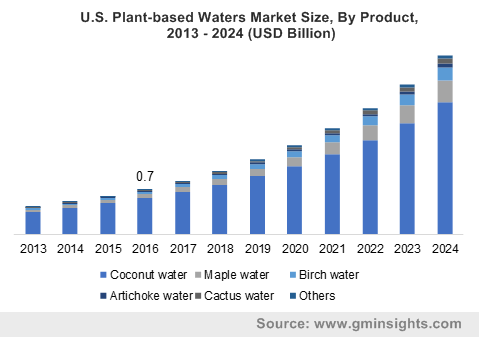Home > Food & Beverages > Beverages > Non-Alcoholic Beverages > Plant-based Waters Market
Plant-based Waters Market Size
- Report ID: GMI1318
- Published Date: May 2017
- Report Format: PDF
Plant-based Waters Market Size
Plant-Based Waters Market size was more than USD 2.5 billion in 2016 and is envisaged to witness phenomenal growth of more than 19 % between 2017-2024./p>

Plant-based waters are the alternatives to the routine beverages and can provide high amount of nutrition. Many of the plant waters remain a lower-sugar, sustainable alternative to routine beverages. These provide trace amounts of nutrition, but like other beverages, it is considered to limit the intake due to their sugar levels./p>
People have become more conscious of their health and are heading towards a healthy lifestyle. The creative packaging has a magnetic effect in increasing the sales of the product. The low-calorie content present in the plant-based waters will boost the global market. Lately, people have been scrutinizing the ingredients present in a diverse range of edible products, which allow them to make informed decisions./p>
| Report Attribute | Details |
|---|---|
| Base Year: | 2016 |
| Plant-based Waters Market Size in 2016: | 2.5 Billion (USD) |
| Forecast Period: | 2017 to 2024 |
| Forecast Period 2017 to 2024 CAGR: | 19% |
| 2024 Value Projection: | 10 Billion (USD) |
| Historical Data for: | 2013 to 2016 |
| No. of Pages: | 225 |
| Tables, Charts & Figures: | 268 |
| Segments covered: | Product, Flavor Variant, Pack Type, Distribution Channel and Region |
| Growth Drivers: |
|
| Pitfalls & Challenges: |
|
Earlier, the sap from the trees was collected by the hole in the tree and bucket. But now, the companies are developing automated solutions that collects sap aseptically from the tree. Beverage companies are opting for contract manufacturing for sourcing sap from trees./p>
On the other hand, sustainability challenges and lack of documented health claims might obstruct the growth of plant-based waters. Sourcing of birch sap is quite an arduous task as this is extracted just for a fortnight in the full year. Supply chains of plant-based waters are more complex as compared to that of carbonated beverages, which can hamper the growth of the product market.
